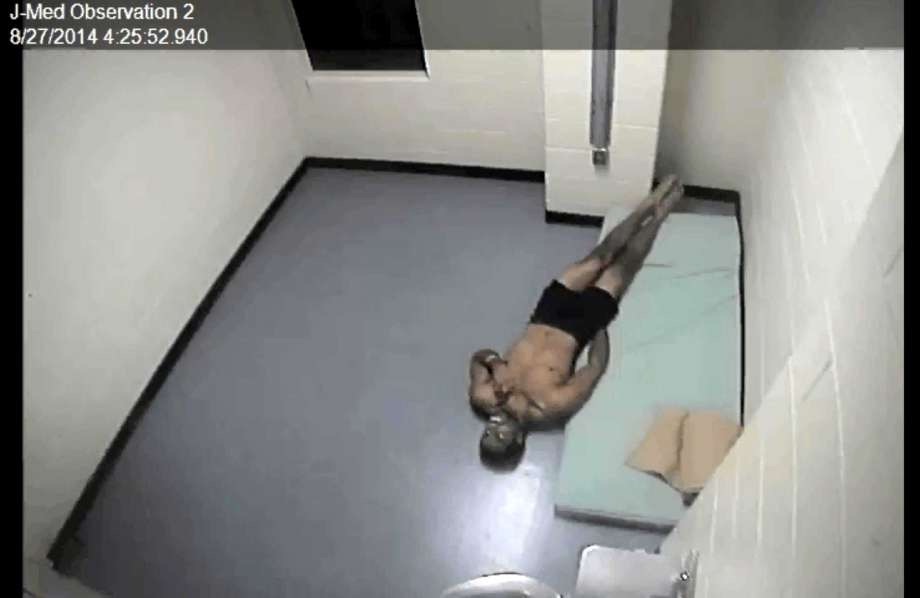Nurses Ignored Black Man for 12 Hours & Refused to Call Ambulance After He Had Stroke @ Uncivilized Albany Jail - $1 million settlement
/ In photo, racist suspect Emre Umar, president of Correctional Medical Care, is questioned on the death of Mark Cannon during a deposition on July 15, 2016.
In photo, racist suspect Emre Umar, president of Correctional Medical Care, is questioned on the death of Mark Cannon during a deposition on July 15, 2016.
From [HERE] A private medical company and Albany County have agreed to pay nearly $1.1 million to the estate of a Black man who died when nurses waited more than 12 hours to call an ambulance after he suffered a stroke while being held at the county jail in August 2014.
Last year, an investigation ordered by the state Commission of Correction determined the care given to 24-year-old Mark Cannon was "so grossly inadequate ... it shocks the conscience."
Mark Cannon, died in August 2014 after suffering a stroke at Albany County jail. Nurses for a private medical company waited more than 12 hours to call an ambulance and were harshly criticized by state investigators for "egregious" errors in care.
The settlement was filed recently in U.S. District Court in Albany, where Cannon's mother had filed a federal lawsuit on behalf of Cannon's infant daughter.

Cannon's symptoms steadily worsened after employees of a medical company that had a contract with the county brushed off his severe neurological symptoms as heat exhaustion, instructing guards to give him water and let him rest.
Later that night, Cannon's condition had deteriorated to the point where he lay nearly motionless on the floor of an infirmary cell with foam oozing from his mouth. A nurse patted his arm and wiped away the saliva, wrongly believing Cannon was recovering from a seizure even though he had no history of medical problems.
A nurse finally contacted a doctor for advice, and he instructed her to immediately call an ambulance. But it was too late: Cannon lingered for several days at Albany Medical Center Hospital before he was removed from life support.

Doctors determined Cannon had suffered a stroke — a loss of blood flow to his brain stem — that may have been caused by working out in the jail's recreation area on the day he fell ill. Emergency surgery might have saved his life, but too many hours had passed after the injury.
The state's investigation cited multiple missteps by nurses, including their repeated failure to acknowledge the severity of Cannon's symptoms or consult a physician until it was too late.
"Mark Cannon had a progressively deteriorating neurological situation that was completely disregarded by nursing staff despite dramatic signs and symptoms of an active neurological emergency and Cannon's repeated requests for medical care," the investigative report states.
The sharp criticism of Correctional Medical Care, a Pennsylvania-based private company, came as the state was probing the company's conduct related to multiple inmate deaths across the state.
The settlement filed in U.S. District Court calls for the company to pay $999,999, and Albany County to pay $95,000. Neither the company nor the county acknowledged any wrongdoing.
Within weeks of Cannon's death, the office of New York's attorney general reached an agreement with the company that allowed it to remain in business in New York with monitoring through May 2018. The company paid a $200,000 penalty and agreed to improve staffing levels and training practices.
At that time, Correctional Medical Care had contracts worth more than $32 million a year with 13 county jails in New York, including Albany and Schenectady counties' facilities
Albany County earlier this year terminated the $3.7 million annual contract it had with CMC since 2012. In a deposition taken as part of a federal wrongful-death lawsuit, Sheriff Craig Apple testified the company's "performance" played a role in his decision, though he said the change was also based on a better offer from another company.
State investigation reports and court records also reveal that CMC's nurses, two of whom were later disciplined by the State Education Department, violated multiple protocols. The failures began the moment a guard called the jail's medical office at 4:12 p.m. on Aug. 26, 2014, to report that Cannon was having problems and needed assistance.
Instead of going to Cannon's tier to check him out as required, a nurse told the officer to give Cannon some water and ask him to lie down.
In the hours that followed, Cannon was shuffled back and forth between his tier and the medical infirmary. At times, cameras showed him staggering into walls and vomiting.
Just after 3 a.m., with new officers and nursing staff on duty, Cannon was found lying on the floor of his cell unable to talk. His eyes were open and he was foaming at the mouth; his legs were stiff and his arms limp. Officers scooped Cannon into a wheelchair and pushed him toward the infirmary. Videos of the transport show Cannon's head tilted to the left and his feet dragging beneath him.
Despite his severe symptoms, no one called an ambulance.
The state's investigation determined nurses "failed to conduct a basic nursing and neurological assessment on a patient with obvious signs and symptoms of a neurological crisis."
Emre Umar of Blue Bell, Pa., is president of CMC, a for-profit company owned by his wife, Maria Carpio. Neither are licensed medical professionals. Umar has acknowledged that for more than 10 years, the company operated in New York in violation of state law requiring a medical care company to be owned by a physician. The firm has since restructured to adhere to the law, although Umar remains in charge of its operations.
Elmer Robert Keach III, the attorney for Cannon's mother, characterized the settlement as "fair" and said the money would benefit Cannon's daughter.




























































































































































































































































































